

Www.nd.edu/~rbarger/www7/puritans.html. The Puritans were a group of people who grew discontent in the Church of England and worked towards religious, moral and societal reforms.
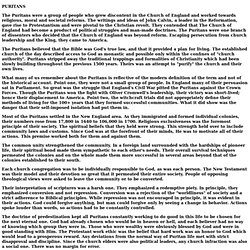
The writings and ideas of John Calvin, a leader in the Reformation, gave rise to Protestantism and were pivotal to the Christian revolt. They contended that The Church of England had become a product of political struggles and man-made doctrines. The Puritans were one branch of dissenters who decided that the Church of England was beyond reform. Escaping persecution from church leadership and the King, they came to America. The Puritans believed that the Bible was God's true law, and that it provided a plan for living. Charlesx3.JPG - Wikipedia, the free encyclopedia.
Sir-Anthony-van-Dyck-Lord-John-Stuart-and-His-Brother-Lord-Bernard-Stuart.jpg - Wikipedia, the free encyclopedia. First English Civil War. The First English Civil War (1642–1646) began the series of three wars known as the English Civil War (or "Wars").
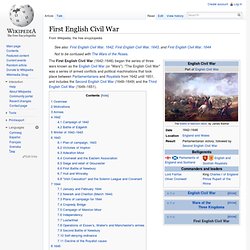
"The English Civil War" was a series of armed conflicts and political machinations that took place between Parliamentarians and Royalists from 1642 until 1651, and includes the Second English Civil War (1648–1649) and the Third English Civil War (1649–1651). Overview[edit] Convention uses the name "The English Civil War" (1642–51) to refer collectively to the civil wars in England and the Scottish Civil War, which began with the raising of King Charles I's standard at Nottingham on 22 August 1642, and ended on 3 September 1651 at the Battle of Worcester.
There was some continued organised Royalist resistance in Scotland, which lasted until the surrender of Dunnottar Castle to Parliament's troops in May 1652, but this resistance is not usually included as part of the English Civil War. Motivations[edit] John Banville: A portrait of Launcelot Northbrook. Provenance Possibly belonged to members of the Wray family in the late 18th and early 19th century; discovered in a farmhouse near Knole, Kent in the late 19th century; acquired by Haden in London before 1892.
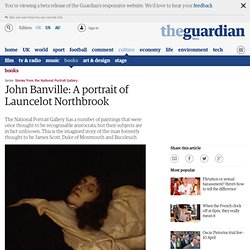
Purchased 1910 (NPG 1566). This unusual portrait of a man on his deathbed was thought to depict James Scott, Duke of Monmouth, and the eldest illegitimate son of Charles II. He was beheaded for leading the Monmouth rebellion in 1685. However, the length of the hair and style of this portrait suggest a date in the 1640s. Deathbed portraiture had some popularity in the 1640s; it helped to secure the reputation of the deceased and provide a visual memory for the bereaved. The story Launcelot Northbrook was born at Chester in 1621. Already as a boy Launcelot had shown a marked skill as a versifier, and a chapbook of his poems printed at his father's shop is dated 1635. Imagined Lives: portraits of unknown people. This display looks in detail at fourteen portraits of people whose identities are uncertain.
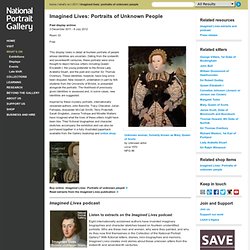
Dating from the sixteenth and seventeenth centuries, these portraits were once thought to depict famous sitters including Queen Elizabeth I, the young pretender to the throne Lady Arabella Stuart, and the poet and courtier Sir Thomas Overbury. These identities, however, have long since been disputed. New research, undertaken in part by MA students from the University of Bristol, is presented alongside the portraits. The likelihood of previously given identities is assessed and, in some cases, new identities are suggested.
Inspired by these mystery portraits, internationally renowned authors John Banville, Tracy Chevalier, Julian Fellowes, Alexander McCall Smith, Terry Pratchett, Sarah Singleton, Joanna Trollope and Minette Walters have imagined what the lives of these sitters might have been like. Buy online: Imagined Lives: Portraits of unknown people Imagined Lives story competition. The Puritans. Puritan Ancestors Thomas Holbrook Immigrated with his wife, Jane Powys about 20 Mar 1634/35 with Reverend Joseph Hull's Company aboard the Marygold.
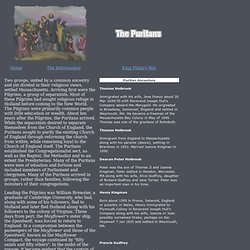
He originated in Broadway, Somerset, England and settled in Weymouth, MA. He became a freeman of the Massachusetts Bay Colony in May of 1645. Thomas was one of the grantees of Rehoboth. Immigrant from England to Massachusetts along with his parents (above), settling in Braintree in 1653. Deacon Peter Holbrook.